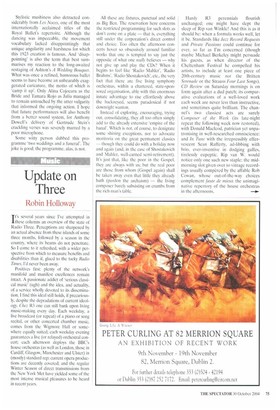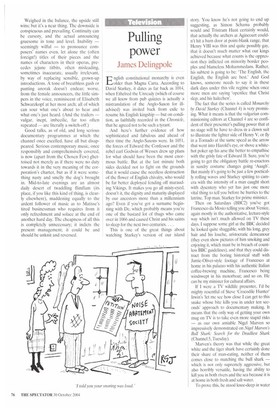Update on Three
Robin Holloway
IVs several years since I've attempted in these columns an overview of the state of Radio Three. Perceptions are sharpened by an actual absence from these islands of some three months, followed by a season in the country, where its beams do not penetrate. So I come to it refreshed, with a wider perspective from which to measure benefits and disabilities than if, glued to the tacky Radio Times, I'd never been away.
Positives first: plenty of the network's manifold and manifest excellences remain intact. A passionate addict of 'serious classical music' (ugh) and the idea, and actuality, of a service wholly devoted to its dissemination, I find this ideal still holds, if precariously, despite the depradations of current ideology. Chez R3 one can still bank upon living music-making every day. Each weekday, a live broadcast (or repeat) of a piano or song recital, or other concerted chamber music, comes from the Wigmore Hall or somewhere equally suited; each weekday evening guarantees a live (or relayed) orchestral concert; each afternoon deploys the BBC's house orchestras (as well as London, those in Cardiff, Glasgow, Manchester and Ulster) in (mostly) standard rep; current opera productions are decently covered; and the regular Winter Season of direct transmissions from the New York Met have yielded some of the most intense musical pleasures to be heard in recent years. All these are fixtures, punctual and solid as Big Ben. The reservation here concerns the restricted programming for such slots as don't come on a plate — that is, everything still under the corporation's direct control and choice. Too often the afternoon concerts hover so obsessively around familiar works that one is tempted to say just the opposite of what one really believes — why not give up and play the CDs? When it begins to feel like 'Radio Mahler', 'Radio Brahms', 'Radio Shostakovich', etc., the very fact that there are five living symphony orchestras, within a chartered, state-sponsored organisation, able with this enormous innate advantage to rise effortlessly above the hackneyed, seems paradoxical if not downright wanton.
Instead of exploring, encouraging, trying out, consolidating, they all too often simply add to the already extensive 'empire of the banal'. Which is not, of course, to denigrate some shining exceptions, nor to advocate moritoria on the great permanent classics — though they could do with a holiday now and again (and, in the case of Shostakmich and Mahler, well-earned semi-retirement). It's just that, like the poor in the Gospel, they are always with us; but the real poor are those from whom (Gospel again) shall be taken away even that little they already hath (pardon the archaism) — the living composer barely subsisting on crumbs from the rich man's table. Hardy R3 perennials flourish unchanged; one might have slept the sleep of Rip van Winkle! And this is as it should be: when a formula works well, let it be. Standards like Jazz Record Requests and Private Passions could continue for ever, so far as I'm concerned (though maybe Michael Berkeley might persuade his guests, as when director of the Cheltenham Festival he compelled his artists, to include at least one piece of 20th-century music not the Britten Serenade or the Strauss Four Last Songs). CD Review on Saturday mornings is on form again after a dud patch; its comparative evaluations of a well-loved work each week are never less than instructive, and sometimes quite brilliant. The channel's two classiest acts are surely Composer of the Week (its late-night repeat the following week now restored), with Donald Macleod, patrician yet unpatronising in well-researched omniscience: and In Tune with the irrepressibly effervescent Sean Rafferty, ad-libbing with brio, ever-inventive in dodging gaffes, tirelessly eupeptic. Rip van W. would notice only one such new staple: the midmorning slot given over to vintage recordings usually compered by the affable Rob Cowan, whose out-of-the-way choices complement faute de ntieux the unimaginative repertory of the house orchestras in the afternoons. Weighed in the balance, the upside still wins; but it's a near thing. The downside is conspicuous and prevailing. Continuity can be cursory, and the actual announcing gruesome in tone and level. Inability — seemingly wilful — to pronounce composers' names even, let alone the (often foreign!) titles of their pieces and the names of characters in their operas, precedes jejune titbits, often misleading, sometimes inaccurate, usually irrelevant, by way of replacing sensible, grown-up introductions. A tone of breathless gush or panting anorak doesn't endear; worse, from the female announcers, the little simpers in the voice, reminiscent of Elisabeth Schwarzkopf at her most arch; all of which can sour what one's about to hear and what one's just heard. (And the trailers — vulgar, inept, imbecilic, far too often repeated — are literally a switch-off.) Good talks, as of old, and long serious documentary programmes at which the channel once excelled, have all but disappeared. Serious contemporary music, once responsibly and comprehensively covered, is now (apart from the Chosen Few) ghettoised not merely as if there were no duty towards it in the very meaning of the corporation's charter, but as if it were something nasty and smelly the dog's brought in. Mid-to-late evenings are an almost daily desert of twaddling flimflam (its place, if you like this kind of thing, is clearly elsewhere), maddening equally to the ardent follower of music as to Matisse's tired businessman who requires from it only refreshment and solace at the end of another hard day. The cheapness of all this is completely unnecessary; it indicts the present management; it could be and should be unknit and reversed.



















































































































 Previous page
Previous page